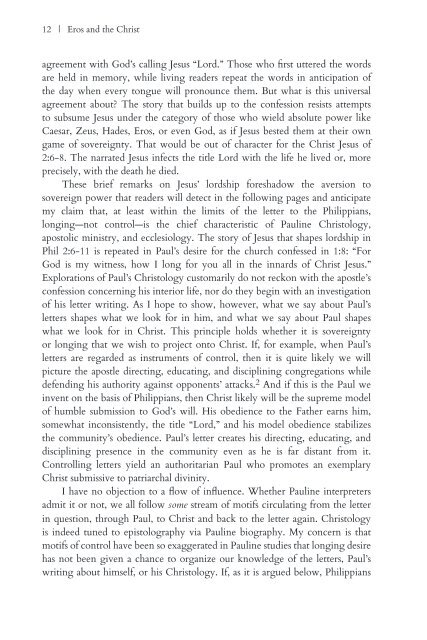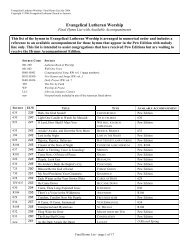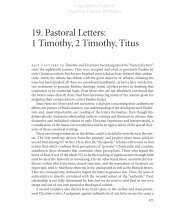Chapter 1 - Augsburg Fortress
Chapter 1 - Augsburg Fortress
Chapter 1 - Augsburg Fortress
Create successful ePaper yourself
Turn your PDF publications into a flip-book with our unique Google optimized e-Paper software.
12 | Eros and the Christ<br />
agreement with God’s calling Jesus “Lord.” Those who first uttered the words<br />
are held in memory, while living readers repeat the words in anticipation of<br />
the day when every tongue will pronounce them. But what is this universal<br />
agreement about? The story that builds up to the confession resists attempts<br />
to subsume Jesus under the category of those who wield absolute power like<br />
Caesar, Zeus, Hades, Eros, or even God, as if Jesus bested them at their own<br />
game of sovereignty. That would be out of character for the Christ Jesus of<br />
2:6-8. The narrated Jesus infects the title Lord with the life he lived or, more<br />
precisely, with the death he died.<br />
These brief remarks on Jesus’ lordship foreshadow the aversion to<br />
sovereign power that readers will detect in the following pages and anticipate<br />
my claim that, at least within the limits of the letter to the Philippians,<br />
longing—not control—is the chief characteristic of Pauline Christology,<br />
apostolic ministry, and ecclesiology. The story of Jesus that shapes lordship in<br />
Phil 2:6-11 is repeated in Paul’s desire for the church confessed in 1:8: “For<br />
God is my witness, how I long for you all in the innards of Christ Jesus.”<br />
Explorations of Paul’s Christology customarily do not reckon with the apostle’s<br />
confession concerning his interior life, nor do they begin with an investigation<br />
of his letter writing. As I hope to show, however, what we say about Paul’s<br />
letters shapes what we look for in him, and what we say about Paul shapes<br />
what we look for in Christ. This principle holds whether it is sovereignty<br />
or longing that we wish to project onto Christ. If, for example, when Paul’s<br />
letters are regarded as instruments of control, then it is quite likely we will<br />
picture the apostle directing, educating, and disciplining congregations while<br />
defending his authority against opponents’ attacks. 2 And if this is the Paul we<br />
invent on the basis of Philippians, then Christ likely will be the supreme model<br />
of humble submission to God’s will. His obedience to the Father earns him,<br />
somewhat inconsistently, the title “Lord,” and his model obedience stabilizes<br />
the community’s obedience. Paul’s letter creates his directing, educating, and<br />
disciplining presence in the community even as he is far distant from it.<br />
Controlling letters yield an authoritarian Paul who promotes an exemplary<br />
Christ submissive to patriarchal divinity.<br />
I have no objection to a flow of influence. Whether Pauline interpreters<br />
admit it or not, we all follow some stream of motifs circulating from the letter<br />
in question, through Paul, to Christ and back to the letter again. Christology<br />
is indeed tuned to epistolography via Pauline biography. My concern is that<br />
motifs of control have been so exaggerated in Pauline studies that longing desire<br />
has not been given a chance to organize our knowledge of the letters, Paul’s<br />
writing about himself, or his Christology. If, as it is argued below, Philippians




